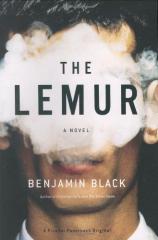The Lemur
Review
The Lemur
THE LEMUR is a bit of a surprise. A relatively short novel ---
it clocks in at under 200 pages --- this new effort from Benjamin
Black does not sacrifice anything to its brevity. Originally
serialized in a weekly magazine, it is a darkly haunting work for
reasons that extend far beyond its plot.
The “Lemur” of the title is seen only briefly --- once,
strictly speaking --- during the course of the novel, yet his
presence permeates the book from first page to last. The prime
mover, however, is John Glass, a man with a storybook life and a
Shakespearian unhappiness. Glass is married to Louise, who, we are
informed early on, is 48 but looks 30. She is also fabulously
wealthy, the daughter of William “Big Bill” Mulholland,
a former CIA agent and present communications overlord. Glass wears
the trappings of success, which both cloak and accentuate his
failure. He is unhappy in his marriage, though at least he retains
the grace to be distressed by his dissatisfaction. Their Manhattan
apartment --- which, as he puts it, is where his wife lives and he
stays --- causes him to yearn for his native Ireland, only recently
vacated at his wife’s request.
A former muckraking journalist known for his dispatches from the
world’s trouble spots, Glass no longer possesses the fire to
write. His only happiness seems to be when he is in the company of
his mistress, a relationship that after only a few minutes seems to
be submerging into the ennui that is drowning the rest of his life.
Big Bill, in the manner of successful fathers-in-law everywhere,
seeks to put Glass to work by retaining him to write
Mulholland’s biography for a fee of $1,000,000. Unable to get
started on the project, Glass does the wrong thing by hiring a
researcher, the brilliantly named Dylan Reilly (the Lemur) who, as
both Glass and the reader immediately sense, is a bit off.
It is with Glass’s initial contact with Reilly that his
already stressed life begins to fracture. Reilly makes a subtle,
vague, blackmail threat that may be directed against Glass or
Mulholland, and is almost immediately murdered. Glass is the only
one of Reilly’s known contacts without an alibi; the reader,
along with Glass, knows he didn’t do the deed, but who did?
The real killer is revealed soon enough --- the book’s
relative brevity ensures this --- but the mystery, such as it is,
takes second place to the character study, which is developed and
sculpted with a subtle touch.
Benjamin Black is the crime-writing pen name for literary author
John Banville, which goes a long way toward explaining the manner
in which THE LEMUR blurs genres to the point where they are not
only indistinct but also irrelevant. I was reminded in a number of
ways of THE GREAT GATSBY, not the least of them being the quality
of this work, for its haunting characters, only a few of which I
have mentioned here and of which Glass is a heavy first among
equals.
Reviewed by Joe Hartlaub on December 30, 2010





